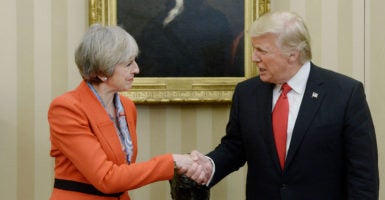In the past 48 hours, a political firestorm has developed across the Atlantic following President Donald Trump’s retweet of a series of video tweets from an obscure, extremist United Kingdom-based political group called Britain First.
This series of retweets has led to widespread condemnation from British politicians on all sides of the political aisle. Britain First is an isolated organization on the fringes of British society, with a history of aggression and confrontation.
The president’s decision to retweet was clearly a mistake, and should be acknowledged as such. It would be wrong for the White House to double down on the matter.
However, the retweet issue should not and must not undermine or weaken the extremely robust alliance between the United States and Great Britain. This “special relationship” is the beating heart of the free world, and vital to American leadership on the world stage.
As British Prime Minister Theresa May declared this morning, the special relationship will endure. The planned state visit of the president to Great Britain, likely to take place next year, must go ahead. It will be an important demonstration of the powerful ties that bind the American and British people.
The calls from members of the Labour Party, including London Mayor Sadiq Khan and Labour Party leader Jeremy Corbyn, to cancel the state visit are reckless and simply preposterous.
Britain’s socialists, led by a far-left ideologue (Corbyn)—who admires dictatorships such as Iran, Cuba, and Venezuela, has expressed support for terrorist groups, including the Irish Republican Army, Hamas, and Hezbollah, and hates America’s role as the world’s superpower—are using this issue as a battering ram to weaken the special relationship as well as to undermine the Conservative British government.
The reality is that the Trump administration and the British government have an extremely close working relationship on a wide range of issues. The present alliance between the U.S. and U.K. is robust, and on many policy matters, significantly stronger than it was under President Barack Obama.
Great Britain and the United States are working closely together on a wide range of fronts, at a time when the free world faces a series of mounting threats. The focus now must be on U.S. support for a successful Brexit, a U.S.-U.K. free trade deal, the global war against the Islamic State and al-Qaeda, standing up to the Russian menace in Eastern Europe, and a host of other key issues that require bold and determined U.S.-British leadership on the world stage.
London and Washington must also work closely on addressing, confronting, and defeating the threat posed by Islamists operating inside Britain, America, and across Europe.
With Britain’s forthcoming exit from the European Union, the special relationship will be even stronger, with a truly sovereign global Britain working closely with the United States and the NATO alliance in advancing prosperity and defending freedom.
And, as former British Prime Minister Margaret Thatcher remarked in a speech in Chicago at the end of the Cold War:
Whatever people say, the special relationship does exist, it does count and it must continue, because the United States needs friends in the lonely task of world leadership. More than any other country, Britain shares America’s passionate commitment to democracy and willingness to stand and fight for it. You can cut through all the verbiage and obfuscation. It’s really as simple as that.






























